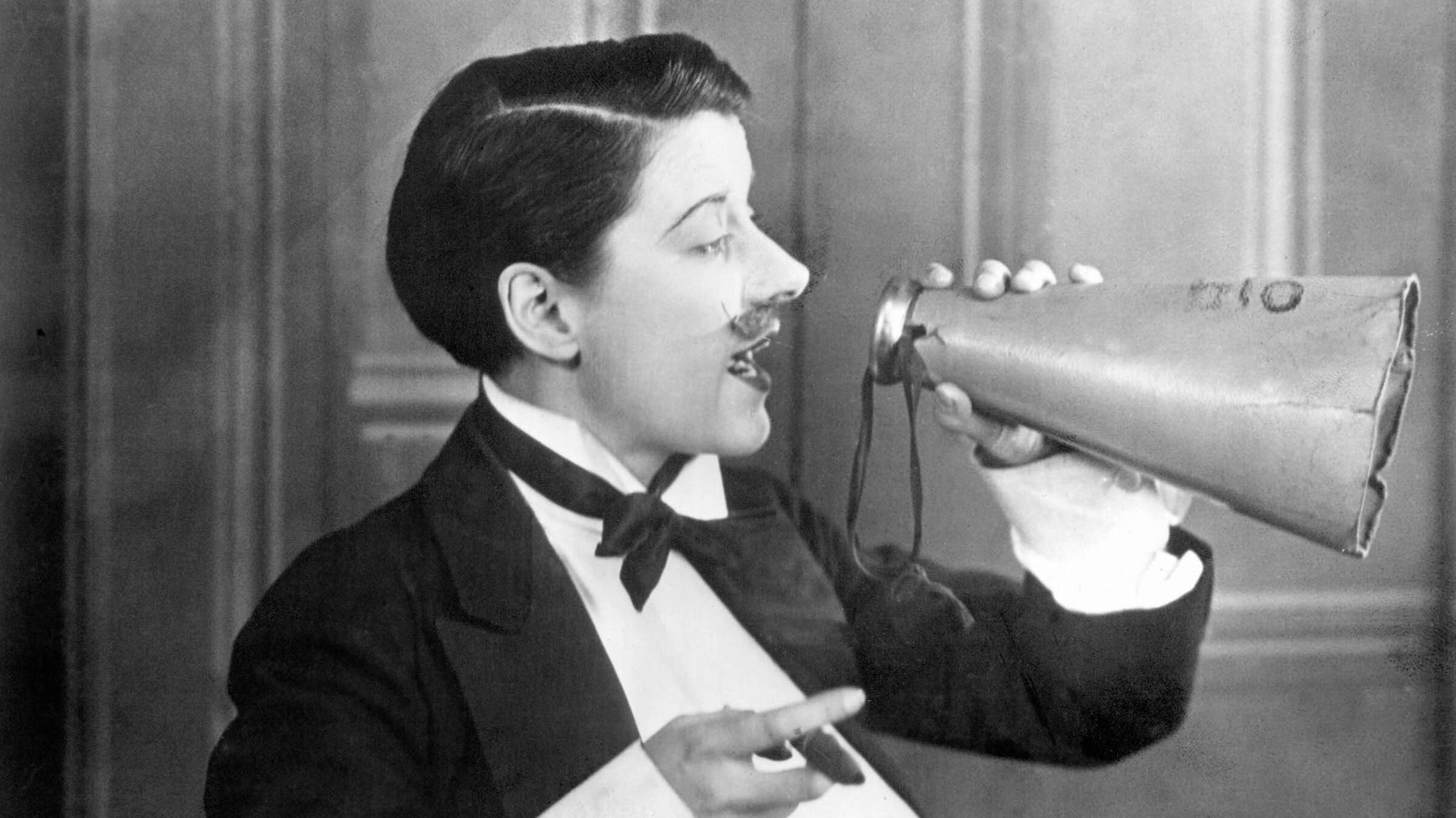In 1926 Beatrice Lillie was a catch, and the Metro-Goldwyn-Mayer studio had sufficient line to reel her in. A hit on the British stage, the Toronto-born Lillie had been called “the Charlie Chaplin of London” and hailed for being able not only to “raise her eyebrow and get a laugh” but also “turn laughter into tears with just the twist of an intonation.” Confrères with Gertrude Lawrence, Ivor Novello, and Noël Coward, she had been a staple in the musical comedy shows of prolific West End producer André Charlot since 1914, and it was in one of his revues that she made her first stateside appearance in 1924.
When she returned to New York in 1926 in another Charlot revue, she was a favorite over here as well, with the Herald Tribune reporting that the sidewalk outside the theater “was thronged with hysterical persons pleading to be let in.” Dubbed “the funniest woman in the world” by American drama critic Brooks Atkinson, Lillie proves it in Exit Smiling, her first film and only silent, which translates her dexterous wit and restrained pathos to the movie screen without a single sound.
In many ways the perfect vehicle for Lillie, Exit Smiling is set in the backstage world of a cut-rate theatrical circuit, all business, hardly any show. A “Cast of New York Favorites” tour in a cramped caboose around the Podunkvilles of white America, slogging nightly through hackneyed material in front of rowdy crowds in folding chairs. Laboring among the cigar-chomping impresario (DeWitt Jennings), unlikely leading man (Franklin Pangborn, in his film debut), and jaded leading lady (Doris Lloyd) is Beatrice Lillie’s Violet, a sunny bit player who thanklessly shines their shoes, irons their chemises, and serves their meals. But she’s no pushover and is ever ready to step into their roles when the slightest opening arises. When we first meet her she’s multitasking in maid getup, polishing the villain’s riding boots while rehearsing with a propped up script of that night’s show (Flaming Women)—not the servant’s paltry lines, but the plentiful ones of the starring role. At a stop along the tour she meets the boy of her dreams (Jack Pickford, Mary’s brother) and adds a love-crush to her list of tasks. Wooing him eventually creates an opportunity for her to play the role of a lifetime.
To ensure an auspicious screen debut for Lillie, MGM gathered just the right collaborators around her, asking prominent playwright Marc Connelly to contribute the story. Connelly was an Algonquin denizen and half the Broadway writing team (with George S. Kaufman) that had conjured the comedy hits Dulcy, To the Ladies, which made a star of Helen Hayes, Beggar on Horseback, and Merton of the Movies, all of which Hollywood snatched up for adaptations. A lively raconteur with access to Broadway behind-the-scenes, he understood the rigors of traveling theater, the personalities of its backstage world, and, above all, Lillie’s gifts: her easy androgyny and subtle deployment of the right look at the right moment. Fresh from a run of Harold Lloyd features (including Safety Last!), Sam Taylor directed. The comedy veteran had production credit on Exit Smiling and cowrote its scenario with Tim Whelan, his frequent partner in finessing gags for Lloyd. Along with title writer Joe Farnham, they outdo themselves with zingy one-liners throughout.
The funniest sequences make use of Lillie’s deadpan expressions and impeccably timed movements. As the set is cleared after one night’s show, the unappreciated, nearly invisible Violet attempts to exit stage right but keeps running into the departing walls, workmen, and furniture—until she at last gives in and ends up carted away stage left, perched on a sofa. Later, serving lunch to the tableful of hungry actors, she’s constantly frustrated in her attempts to divert the tastiest morsels to the newest member of the troupe, and the object of her affections. With barely a flourish, she switches her nearly empty serving plate with the full one of a particularly ravenous diner, then resumes redistributing the food. The final scenes are built around a one-woman chase to the finish in order to save Pickford from permanent ignominy and immediate arrest. The rescue of sorts happens to coincide with her big break, and we get to see her play not only Flaming Women’s mustachioed villain but also its strutting vamp, complete with rushed costume changes.
Exit Smiling premiered November 1926 and, while some reviewers had complaints, they unanimously praised Lillie’s performance. Film Daily called it a “clever burlesque” that provided her “every possible chance to display the mannerisms and tricks that won her no little popularity as the star of Charlot’s Revue.” Variety dismissed Jack Pickford as “undeserving” and proclaimed that film newcomer Lillie “runs away with the picture.” Profiles in fan magazines were timed with the film’s release and Lillie seemed primed for a big Hollywood career.
By December, however, Lillie had already returned to the New York stage, first in Oh, Please, which prompted Algonquin notable Robert Benchley to declare: “If we never had Beatrice Lillie we might better never have been born.” Then she starred in She’s My Baby, with music by Rodgers and Hart, followed up by the more successful 1928 revue, This Year of Grace, for which its author, famed British wit Noël Coward, wrote several songs expressly for Lillie. Marveling about her appearance in Coward’s show, one reviewer captured the essence of Lillie’s overall appeal: “It was more devastating to see one corner of her mouth twitch than to see some comedians fall down the stairs.”
She returned to the screen only sporadically, for 1929’s Show of Shows, the Warner Bros. ode to the wonders of sound, and then the next year for her first all-talkie, Are You There?, which was very poorly reviewed and released only half-heartedly in 1931. She appeared in the 1938 musical Doctor Rhythm, with Bing Crosby, and later, in 1944, opposite Clive Brook in the British-made On Approval, which Lillie biographer and confidant Bruce Laffey concluded “was not destined for greatness.” Her final on-screen appearance was in 1967 as the dastardly Mrs. Meers in the George Roy Hill-directed Thoroughly Modern Millie. Splitting her time between the London and New York theater worlds, she continued her prodigious stage career, including 276 performances on Broadway of her celebrated one-woman show, An Evening with Beatrice Lillie, which went on to tour widely and garnered her a long-deserved Tony Award in 1953. Two other nominations followed. In 1958 she began a year-plus run at London’s Adelphi Theatre as Auntie Mame, after replacing Greer Garson in the role on Broadway.
In her delightfully cheeky autobiography, published in 1972, Lillie devotes about a chapter to her experience in silent-era Hollywood, dishing about the San Simeon crowd and her liaisons with John Gilbert and Rudolph Valentino. In the few pages on the actual production she reveals why she chose not to parlay her triumph in Exit Smiling into a more robust film career. “Most of the time,” she writes about the shoot, which felt disjointed and rushed to her, “I couldn’t make out what the movie was all about.” In describing the film’s story, she even calls Jack Pickford the “hero” of the picture, when, of course, her own Violet clearly is.
Laffey explains that Lillie simply didn’t like the silence that greeted her scenes on set: “She hated not knowing if she was funny.” Onstage she could be immediately sure. When she appeared on Broadway in 1944 for the Cole Porter revue Seven Lively Arts, she was the main attraction, both on opening night and in the next day’s papers. “[T]he occasion was undoubtedly Miss Lillie’s,” assessed the New York Times critic. “Well-remembered and loved, and now welcomed home again, she stopped the show before she uttered a word. Permitted finally to proceed, she proved that she still is immense.”
Presented at A Day of Silents 2018 with live music by Wayne Barker

